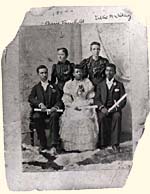
TREASURES OF SOUTH FLORIDA LIBRARIES
A CELEBRATION OF RARE & UNIQUE MATERIALS
Special Collections Divison > Treasures of South Florida Libraries Home > Bethune-Cookman College > Next

Graduates, 1894. 1894. Cookman Institute Jacksonville.
Photograph.
Front row: Charles Henry Cantwell; Drew Sanders Hayes; Carrie Fanny Lee.
Back row: Carrie Fairchild; Lillie [or Lily] M. Whitney, teachers.
Bethune-Cookman College. College Archives, Carl S. Swisher Library and Learning Resources Center. Daytona Beach, Florida.
The Carl S. Swisher Library and Learning Resource Center contains over 136,250 books, periodicals and other materials. The College Archives houses documentary, photographic, and other material of historic value to the college. Special Collections includes the Joseph M. Taylor, the Thelma Harris Livingston, the Florence Roane and the Negro Collection of books by and about blacks.
Mary McLeod Bethune.On October 3, 1904, Mary McLeod Bethune opened Daytona Educational and Industrial School for Negro Girls. Bethune, the first free-born child of former slaves, had been educated at Scotia Seminary in North Carolina and Moody Bible College in Chicago. She devoted her life to teaching. Learning that Daytona had no schools for black children, Bethune left her teaching job in Palatka to begin one. Bethune was able to raise money from the rich Northerners who wintered in Daytona including John D. Rockefeller, Henry J. Kaiser and James G. Gamble of Proctor and Gamble. Gamble served on the first board of trustees and helped purchase property for the school. Donations from Thomas H. White of the Singer Sewing Machine Company helped to construct the first buildings on the campus including Faith Hall and White Hall, the administration building. In 1925 the school officially merged with Cookman Institute for Boys of Jacksonville, which was run by the Methodist Episcopal Church North. Cookman had been founded in 1872 by Reverend D.B.S. Darnell and was the first school of higher learning for blacks established in Florida. Cookman has a strong endowment but a small student body while Bethune's school was steadily growing. The new school, Daytona-Cookman Collegiate Institute, later Bethune-Cookman College, was financially stable and coeducational. Bethune remained the school's president. In 1932 the school began a junior college program, and in 1941 a four year college degree program in liberal arts and teacher training was started. Today the college offers B.A. and B.S. degrees in a wide range of subjects.
Mary McLeod Bethune was active in many areas. She was president of the National Association of Colored Women, served in the Red Cross and was a board member of The Urban League. In 1932 President Franklin D. Roosevelt appointed her to the advisory committee of the newly formed National Youth Administration and later made her administrator of the Office of Minority Affairs, a branch of the NYA. In 1935 Bethune received the NAACP Springarn Medal, one of the highest honors of the organization. In 1945 she was a consultant at the San Francisco Conference, where the charter of the United Nation was drafted.
Bethune worked and strived for her race and her school until the time of her death in 1955. Today Bethune-Cookman College stands as a monument to her and her work.
Graduates, 1894. Cookman Institute, Jacksonville. [n.d.] Photograph. Front Row: Charles Henry Cantwell; Drew Sanders Hayes; Carrie Fanny Lee. Back row: Carrie Fairchild; Lillie [or Lily] M. Whitney, teachers.
Class Photograph. Cookman Institute, Jacksonville. [n.d.] Photograph.
Reverend D.B.S. Darnell, the founder of Cookman Institute, is in the middle of the back row.
Lily Whitney, a teacher, is the last person on the right in the back row.
Annual Commencement. Cookman Institute, Friday, May 10th, 1895... Jacksonville, Florida.
The Advocate Catalogue. Edition of 1926-1927. Vol. 23, no. 9. Published by Bethune-Cookman College, Daytona Beach, Florida, 1904-1927. The school catalog after the merger with Cookman Institute.
The Wild-Cat for 1930. Published annually by Students of Bethune-Cookman College, Daytona Beach. The school year-book for 1930.